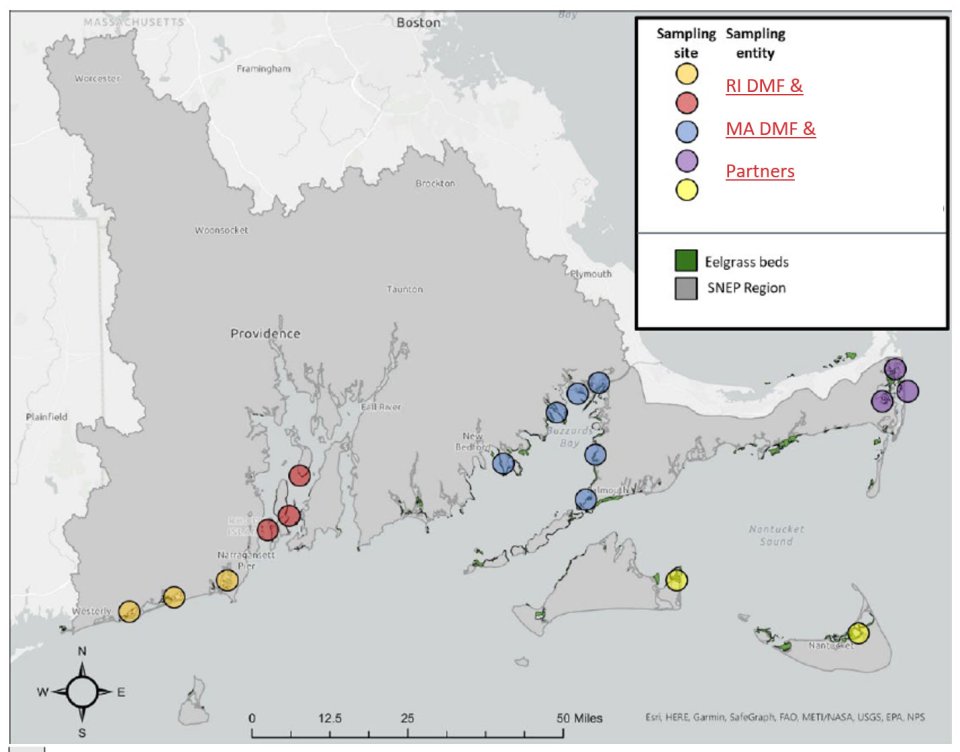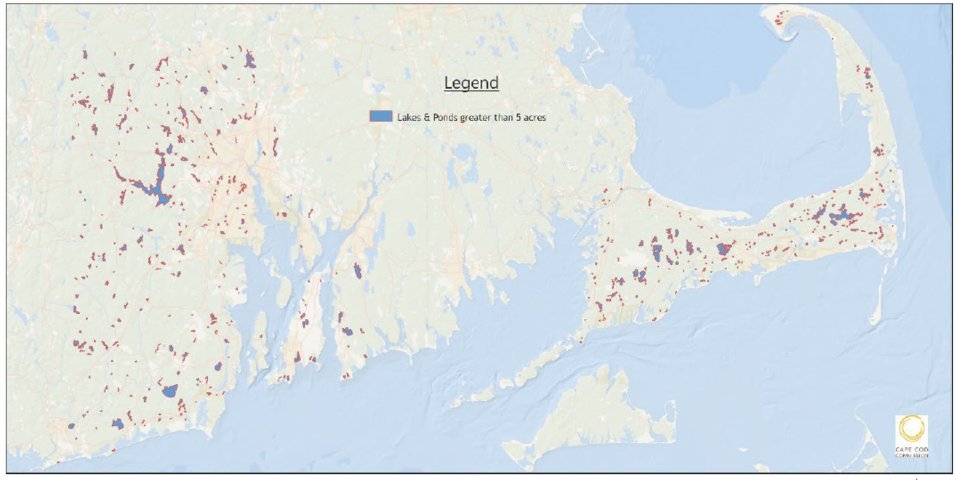SNEP Priority Research Awards
ABOUT:
The Southeast New England Program Priority Research Grants Request for Applications (RFA) was released on June 5, 2023. The grant competition was a single-phase process where eligible applicants were invited to apply for funding consideration by July 28, 2023.
The RFA set out a competitive process to select between three and six (3-6) projects that would fill informational/knowledge gaps in the following Priority Research Areas identified by SNEP and its Steering Committee in support of the goals outlined in the SNEP Strategic Plan:
- Modeling and assessing coastal lake and pond health.
- Lessons learned from implementing permeable reactive barriers.
- Eelgrass viability: flowering and seeding, impacts of climate change, long-term prognosis.
Two projects were selected for funding, worth a total of $704,970 ($597,820 Federal Funding; $107,150 Matching Funds).
PROJECTS SELECTED FOR FUNDING:
"Identifying Eelgrass Flowering Phenology and Seed Distribution Across the SNEP Region to Develop Resilient Eelgrass Ecosystems"
Rhode Island Department of Environmental Management (RIDEM)
Federal Request: $299,293
Match: $45,343
Eelgrass is a critical marine habitat that provides a multitude of ecosystem services in estuaries and along coastlines throughout New England, yet it has been in steady decline throughout the region. Efforts to restore eelgrass populations to date have largely focused on the transplantation of adult plants which are time- and labor-intensive, short term, and limited in scale and scope, which has hampered their success. In contrast, seed-based eelgrass restoration offers an alternative that has the potential to be significantly less time- and labor-intensive, long term, large scale, multifaceted in scope and led to restoration success in other regions of the U.S. However, information on the phenology, timing, and distribution of eelgrass flowering in the SNEP region is still needed to determine if eelgrass beds could be successfully restored from eelgrass seeds.
Rhode Island Department of Environmental Management's Division of Marine Fisheries (RI DMF), in partnership with the Massachusetts Division of Marine Fisheries (MA DMF), will bridge this knowledge gap and build regional capacity for successful future eelgrass restoration. This project will document the timing of eelgrass seed maturation and density of mature eelgrass seeds in the Rhode Island coastal ponds, Narragansett Bay, Buzzards Bay, Pleasant Bay, Nantucket, and Martha's Vineyard.
This project will generate a model of eelgrass reproductive phenology for the SNEP region. Further, this project will collaborate with parallel efforts monitoring eelgrass flowering phenology in other areas of New England to maximize the transferability of this product and thus enhance the resilience of ecosystems in the coastal waters of the SNEP region, as well as New England more broadly, by filling a knowledge gap relevant to the restoration of a critical habitat.

Image credit: RIDEM
"Development of Automated Remote Sensing Methods for Water Quality Mapping from 2017 to 2026 to Better Understand Changing Conditions in Cape Cod and Rhode Island Lakes and Ponds"
Cape Cod Commission
Federal Request: $298,527
Match: $61,806
Freshwater ponds and lakes provide critical ecosystem benefits on Cape Cod and throughout the SNEP
region by providing valuable fish and wildlife habitat, opportunities for recreation, and valuable aesthetic and cultural values for residents and visitors. Ponds and lakes are especially important historical components of cultural traditions and in many cases continue to serve as a source of food for indigenous populations and local communities, values that can be overshadowed by public recreational uses (e.g., swimming beaches) or the concerns of dedicated pond advocacy groups. Healthy and properly functioning ponds also contribute to the natural cycling of nitrogen through uptake by plants, denitrification, and other processes (Cape Cod Commission, 2021a). On Cape Cod and in other coastal areas where there is little natural attenuation of groundwater nitrate, ponds serve as the primary mechanism to intercept and naturally reduce nitrogen inputs from septic systems, fertilizer, and stormwater runoff before these reach and impact coastal marine waters. Despite the importance of ponds in coastal watershed health, there are significant spatial and temporal data gaps in current freshwater monitoring programs in the SNEP Region, due to reliance on staff and volunteers traveling in the field to collect water quality measurements and samples for laboratory analysis. Data from existing satellite imagery, on the other hand, offers the potential to fill those gaps by developing models for consistent estimates of water quality parameters for all lakes in the region on a regular basis from 2017 to 2026.
Through this grant, The Cape Cod Commission, in partnership with the University of Minnesota, the Association to Preserve Cape Cod, and the University of Rhode Island's Watershed Watch, will create a model for lake and pond water quality and clarity within the SNEP region. The goal is to ground truth satellite imagery with in-situ data obtained from partners APCC and The URI Watershed Watch for both historic data and additional samples to be collected during the project period. The resulting regional lake assessment applying automated remote sensing methods to 2017-2026 will aid in the rapid screening of lake health throughout the SNEP region, enabling managers to evaluate appropriate measures for remediation and protection in a timely manner.

Image credit: Cape Cod Commission
